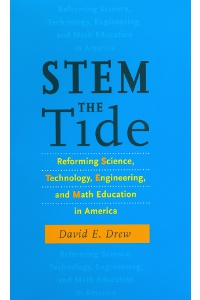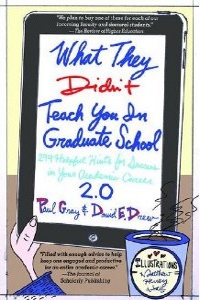|

Order from Amazon
Order from Barnes and Noble
One study after another shows American students ranking behind their international counterparts in the STEM fields: science, technology, engineering, and math. Businesspeople such as Bill Gates warn that this alarming situation puts the United States at a serious disadvantage in the high-tech global marketplace of the twenty-first century, and President Obama placed improvement in these areas at the center of his educational reform. What can be done to reverse this poor performance and to unleash America’s wasted talent?
David E. Drew has good news and the tools America needs to keep competitive. Drawing on both academic literature and his own rich experience, Drew identifies proven strategies for reforming America’s schools, colleges, and universities, and his comprehensive review of STEM education in the United States offers a positive blueprint for the future. These research-based strategies include creative and successful methods for building strong programs in science and mathematics education and show how the achievement gap between majority and minority students can be closed.
To secure a competitive advantage both in the knowledge economy and in economic development more broadly, America needs a highly skilled, college-educated workforce and cutting-edge university research. Drew makes the case that reforming science, technology, engineering, and mathematics education to meet these demands, with an emphasis on reaching historically underserved students, is essential to the long-term prosperity of the United States. A crucial measure, he argues, is recruiting, educating, supporting, and respecting America’s teachers.
Accessible, engaging, and hard hitting, STEM the Tide is a clarion call to policymakers, administrators, educators, and everyone else concerned about students’ participation in the STEM fields and America’s competitive global position.
Collapse All | Expand All
Frances K. Stage and Phyllis H. Schulz, The Journal of Higher Education, October 31, 2016
Drew's book is required reading for scholars of STEM achievement at any level. Drew thinks of mathematics and science broadly and embraces multiple conceptual approaches to the study of the topic. This would be an excellent book for a higher education policy analysis or theoretical framework course, as it exemplifies ways of challenging normative thinking. The works he cites come from a combination of disciplines: (1) economics--to calculate micro costs of STEM underachievement to individuals and communities as well as macro costs to states and the nation; (2) sociology--to place the problem within gendered, ethnic, and class population groups; and (3) education and psychology--particularly research related to the links between self-concept and expectations and ultimate achievement. https://doi.org/10.1080/00221546.2013.11777314
Nancy Holincheck, Education Review, January 16, 2013
Drew's STEM the Tide provides a valuable analysis of current science and math education policy issues and provides useful solutions to implement reform in these areas. Science and math educators at all levels will find this an edifying book to spur discussion. Drew's solutions to help implement real reform of science and math education include (a) leadership; (b) evaluation;
(c) better teachers; (d) high expectations; (e) committed
mentors and role models; (f) value of a college education;
(g) closing the achievement gap; and (h) revitalizing
university research. On the surface these solutions seem
simple, but in this well
-referenced book, Drew presents
clear and concise recommendations for each of these
solutions. His use of research findings from both case
studies and quantitative research interspersed with relevant
anecdotes make for both an illuminating read and a
thorough discussion of science and mathematics education
challenges and solutions for reform.
http://www.edrev.info/reviews/rev1206.pdf
Geeta Verma, Teachers College Record, July 12, 2012
STEM the Tide: Reforming Science, Technology, Engineering, and Math Education in America is a contemporary, timely, and focused discussion about reforming science, technology, engineering, and mathematics (STEM) education in the US. The author of the book, David E. Drew, has had a long career in higher education, primarily focusing on STEM education. His academic and scholarly work demonstrates rigor, intellectual fervor, and a passion for equity conversations in STEM areas (he specifically focuses on STEM recruitment and retention issues). While his background is mainly in mathematics and mathematics education, he has taken on one of the most discussed topic of our times in this book: recruitment and retention of both mainstream and minority students in STEM fields and what that may mean for economic growth in the US.
http://www.tcrecord.org ID Number: 16822

Order from Amazon
Order from Barnes and Noble
This irreverent, but serious, guide to what life in higher education institutions is now enhanced by 100 new tips--invaluable advice that ranges from getting your Ph.D. to setting the course of your academic career.
Just landed your first faculty position? Close to getting your Ph.D., and planning a career in academe? What will academic life be like? How do you discover its tacit rules? Develop the habits and networks needed for success? What issues will you encounter if you're a person of color, or a woman? How is higher education changing?
Paul Gray and David E. Drew share their combined experience of many years as faculty and (recovering) administrators to offer even more insider advice - the kind that's rarely taught or even talked about in graduate school - to help you succeed.
The 100 new hints expand sections on the dissertation process, job hunting, life in the classroom, and dealing with students; as well as on matters vital to your progress, such as research, publication, and tenure. The book concludes with a tongue-in-cheek appendix on How to Become a Millionaire while an academic. |
- Aptitude Revisited: Rethinking Math and Science Education For America's Next Century. Baltimore, MD: Johns Hopkins University Press, (1996), 275 pages. (Also excerpted in the Journal of Science Education and Technology,Vol. 7, No. 4,1998.)
- Strengthening Academic Science. New York: Praeger, 1985, 283 pages.
- Computer Aptitude, Interest and Literacy Profile, a psychometric instrument published by Pro-Ed (Austin, TX), 1984. A book-length manual accompanies this test. (co-author).
- Increasing Student Development Options in College. San Francisco: Jossey-Bass, 1978, 106 pages (editor).
- Competency, Careers and College. San Francisco: Jossey-Bass, 1978, 114 pages (editor).
- Science Development: An Evaluation Study. Washington, DC: National Academy of Sciences, 1975, 182 pages.
- Portions of the above book are reprinted in the companion volume: Science Development, University Development and the Federal Government, Washington, DC: National Academy of Sciences, 1975, 48 pages.
- As Others See Us: Three Key Publics Assess West Virginia University, 1972 (co-author)
|